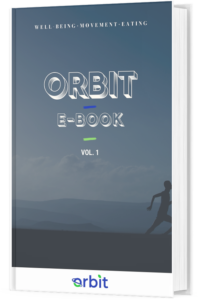Find foods that you find tasty and that honor your health. In the process, remember that there is no harm in eating foods that may be less nutritious at times. Deprivation does not work. What you eat over time is what matters.
Intuitive Eating1 is a book, created by Evelyn Tribole and Elyse Resch, that presents 10 principles to create a healthy relationship with your food, body, and mind. The 10 principles build upon one another. Work on every principle one by one. If you have not read the Principle #1, Principle #2, Principle #3, Principle #4, Principle #5, Principle #6, Principle #7, Principle # 8, or Principle #9, please refer to it before getting into this article.
Healthy Relationship with Food
Developing a healthy relationship with food is a fundamental step to healthy eating. This is why healthy eating is the last principle in the intuitive eating series. Without coming to terms with the previous principles, healthy eating may not be intuitive.
Healthy eating can be defined as:
Having a healthy balance of foods and having a healthy relationship with food.
(Tribole & Resch, 2012, p.204)
A healthy relationship with food means that you make food choices without the choice impacting the way you view yourself. Your food selection does not define who you are.
Worries surrounding Food Consumption
Even though you may have trained your body to rely on your internal cues, the media’s headlines and external people’s opinions and discourse may get you confused and worried about your food choices. Worrying about your food consumption is normal when media messages create the impression that food will either:
kill or heal you, or make you fat.
(Tribole & Resch, 2012, p.197)
Food combining (belief that combining certain foods will help you lose weight and help your digestion), juicing or any fad diets are ways of eating people have read about in the media or heard about from people that they may know. There is a belief that this restrained way of eating will raise their metabolism or allow them to lose fat. We have clearly established through the intuitive eating series that this is simply not true. Reversely, one may gain weight, lower their metabolism and increase their fears and worries surrounding their food consumption.
Perception of Food: United States of America versus France
Worries surrounding food does not function the same across different countries. Rozin and colleagues (1999) were the authors to the first study to explore the attitude of food and the role of food in the life of 4 different cultures. We will dive into the stark contrast between the findings from the U.S.A. and France. The country associating food the most with health and the least with pleasure was the U.S.A. Reversely, the group that associated food the most with pleasure and the least with health were the French. Interestingly, the Americans were found to alter their diets the most in the name of health and were the least likely to consider themselves as ‘healthy eaters’.
The French are known for the paradox of them not eating healthfully, yet eating small quantities. That being said, the French have half the obesity incidence in contrast to the Americans, have a longer life expectancy, less medication prescriptions and lower heart disease death rates. Tribole and Resch (2012) believe that the attitude of the French toward food may explain these statistics. People in France have a positive relationship with food, savor every bite, eat slower, creating a satisfying experience with less.
Social Determinants of Health: The Roseto Effect
The Roseto Effect is a concept illustrating, in part, that sometimes the most “unhealthy diets” do not have negative effects on health (such as the French have proven). The Roseto Effect was a discovery made by Wolf (1994) in a study conducted in a Italian community in Roseto, Pennsylvania. In this study, the population in that community were known for having an unusually low rate of deaths from heart related issues in comparison to neighboring communities. Their healthy behaviors were not related to their heart health as the community was known for their consumption of animal fat, lack of exercise and cigarette smoking. Wolf (1994) concluded that social cohesion and social support was the protecting factor against heart diseases! Malcolm Gladwell’s book entitled “Outliers” begins with an introduction about the Roseto Effect. As the Roseto Effect shows, health is a broad concept that cannot solely be defined by what people eat. Such as Gladwell explains with regards to people’s success, health is a social and cultural phenomenon. Health is a nuanced and complex topic. Please keep this in mind as we dive into the external world of health guidelines.
Achieving Authentic Health
Achieving authentic health is a process of dynamic integration of your inner world and the external world of health guidelines, which include exercise and nutrition.
(Tribole & Resch, 2012, p.204)
Throughout the intuitive eating series, we have mostly addressed one’s inner world: Diet mentality, hunger cues, satiety cues, satisfaction, emotions and respect. We discussed how to become more attuned to your inner self and to honor and respect your internal cues. The time has come to integrate the external world, which includes health policies and philosophical preferences (local foods, vegetarianism, veganism). Integrating the external world of health guidelines into your food choices does not mean you must abide by all of their recommendations. You can choose which guidelines resonate with you.
“Eat a Balanced Diet and a Variety of Foods”
This is a guideline we all know! And it is a good one! Fruits and vegetables are often the foods that come to mind when we think about eating a variety of foods. Eating a variety of foods also means eating different types of bread, cereals, milk, pasta, etc. Also, achieving balance happens progressively, over time. One day of play foods will not negatively impact your health.
Quantity
Relying on internal cues makes for food quantity to be less of an issue. Intuitive eaters learn how to stop eating when comfortably satisfied, no matter how much food is left. However, environmental contributors play a role in our food consumption, whether we are intuitive eaters or not: Friends, family, packaging, plate, lighting, smells, distractions, and so on. Notably, eating while being distracted (e.g. watching television, readings, texting) is a major contributor to mindless eating. Mindless eating has been found to increase one’s quantity of food eaten. That being said, eating enough is extremely important for your metabolic rate, energy and overall well-being.
Quality
When considering quality, remember that finding foods that honor your health and palate is possible! The concept of gentle nutrition describes this:
Taste is important, but health is still honored, without guilt.
Tribole & Resch, 2012, p.207
As we have covered within a healthy food recommendations article, based on Canada’s food guide, here are some examples of foods that honor your health. These foods may lower your risks of many chronic diseases.
- Eat fruits and vegetables
- Eat enough fish
- Drink enough, and prioritize water
- Find nutrient dense foods (whole grains, beans, nuts, soymilk, etc.)
- Eat protein-rich foods
- Eat enough good quality fat
- Eat whole foods (whole grain bread, whole grain rice, whole grain pasta, quinoa, oatmeal, millet, fruits, veggies)
Final Considerations
Making informed choices about your food while considering the pleasure factor can be difficult. If you have truly become an intuitive eater (See questionnaire in principle #1), you may decide to look at the food label to compare foods. For example, there are two types of soups you love, but one has double the sodium, consider taking the one with less sodium. If you feel you are hungry soon after breakfast, consider looking at the food labels of what you are eating. Is there enough protein? Most importantly, remember the pleasure in eating.
- Are you asking yourself what you want to eat before eating?
- Do you like the food you are eating?
- How do you feel after eating different foods?
- How do you feel overall? Is my energy level high or low?
- Are you savoring your meal?
- Are you ignoring peoples’ comments about your eating?
THANK YOU SO MUCH FOR READING THE INTUITIVE EATING SERIES. I truly hope the articles and book have led you to reconsider some societal beliefs about food and allowed you to foster a positive relationship with food and healthy eating.
References
- Tribole, E., & Resch, E. (2012). Intuitive eating: A revolutionary program that works. St Martin’s Press.
- Rozin, P., Fischler, C., Imada, S., Sarubin, A., & Wrzesniewski, A. (1999). Attitudes to Food and the Role of Food in Life in the U.S.A., Japan, Flemish Belgium and France: Possible Implications for the Diet–Health Debate. Appetite, 33(2), 163–180. https://doi.org/10.1006/appe.1999.0244
- NationMaster. (2013). Health stats: Compare key data on France & United States. https://www.nationmaster.com/country-info/compare/France/United-States/Health#2013
- Wolf, S., Grace, K. L., Bruhn, J., & Stout, C. (1974). Roseto revisited: Further data on the incidence of myocardial infarction in Roseto and neighboring Pennsylvania communities. Transactions of the American Clinical and Climatological Association, 85(Journal Article), 100–108.
- Wright, J., O’Flynn, G., & Welch, R. (2018). In search of the socially critical in health education: Exploring the views of health and physical education preservice teachers in Australia. Health Education (Bradford, West Yorkshire, England), 118(2), 117–130. https://doi.org/10.1108/HE-11-2016-0060
- Wansink, B. (2011). Mindless eating: Environmental contributors to to obesity. In Cawley, J. (Eds.) The Oxford Handbook of Social Sciences of Obesity (chapter 13). Oxford University Press. DOI: 10.1093/oxfordhb/9780199736362.013.0023






This Post Has One Comment
Pingback: Soy Myth Debunked: A Healthy Source of Protein - Orbit
Comments are closed.